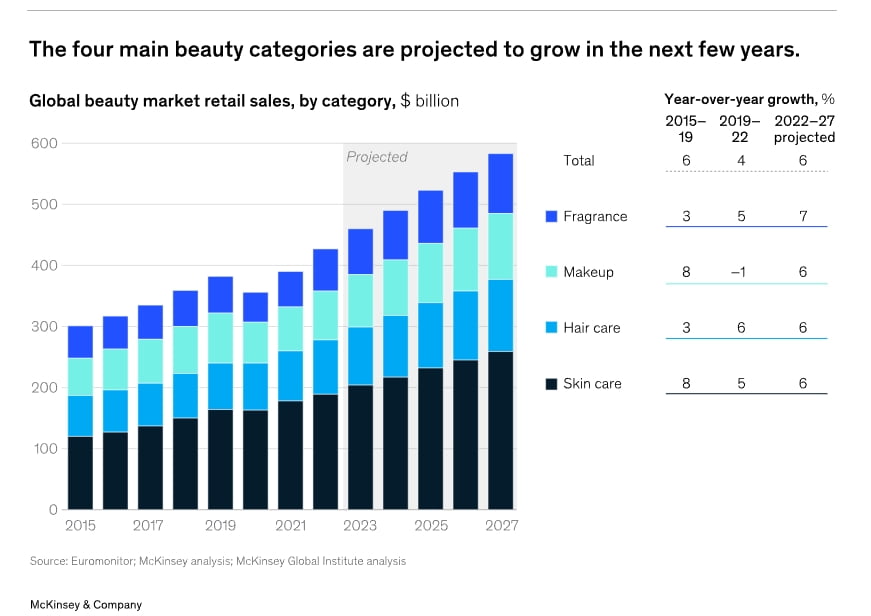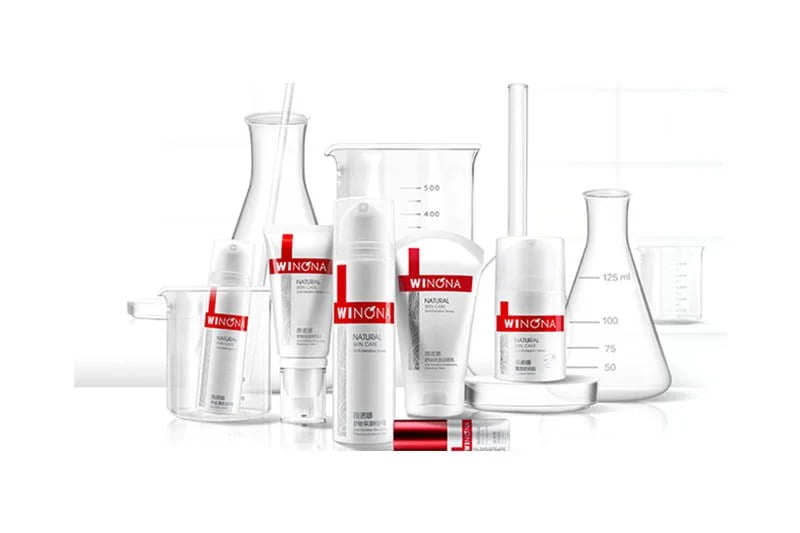The allure of the beauty industry continues to attract new businesses and investors. To succeed in this competitive and changing market, brands must find ways to stand out.
Analysis of Cosmetic Industry
The beauty industry is a dynamic sector poised for significant disruption, expected to transform through a broadening range of products, distribution channels, and markets by the end of the decade. This transformation will be driven by consumers, particularly younger generations, whose evolving definitions of beauty will influence their views on sustainability, the impact of influencers and key opinion leaders, and the importance of self-care. The beauty industry is projected to experience “premiumization,” with the premium segment anticipated to grow at an annual rate of 8 percent, outpacing the 5 percent growth in mass beauty between 2022 and 2027. This trend will be fueled by consumers trading up and increasing their spending, especially in the fragrance and makeup categories.

Several factors have contributed to the growth of e-commerce in the beauty sector: the expanded beauty product offerings from online giants like Amazon in the United States and Tmall in China; the advanced digital strategies of direct-to-consumer brands; the rising importance of online sales for omnichannel retailers; and the surge in social selling, including livestreaming, particularly in Asia. E-commerce is projected to remain the fastest-growing sales channel, with a 12 percent annual growth rate between 2022 and 2027. However, traditional channels such as specialty retail, grocery stores, and drugstores are expected to see increased growth post-pandemic, driven by consumers’ continued interest in in-store product discovery and trials. Meanwhile, department stores are likely to continue losing market share globally.
Top 10 Cosmetic Manufacturers In the World
The world’s largest cosmetics manufacturers include the following:
L’Oreal Group
L’Oreal Group, based in France, is the largest cosmetics company in the world. It was founded in 1907 or 1909 (evidence varies) and operates in more than 150 countries and regions, producing 4 billion cosmetics products annually.
Unilever
Unilever, based in the United Kingdom, is also one of the top global cosmetics companies, competing fiercely with companies like L’Oreal and Estée Lauder.
Estée Lauder
Estée Lauder, based in the United States, is known for its high-end brands such as La Mer, Tom Ford, and is an important player in the global cosmetics market.
Procter & Gamble
Procter & Gamble, based in the United States, is also one of the giants in the global cosmetics industry and owns numerous well-known brands.
LVMH
LVMH, based in France, is a leader in the global luxury market with luxury brands such as Dior and Givenchy.
Beiersdorf
Beiersdorf, based in Germany, is also an important player in the global cosmetics market, with double-digit sales growth in 2023.
Shiseido
Shiseido, based in Japan, has a significant presence in the global market with its combination of traditional and innovative product strategies.
Coty
Coty, based in the United States, specializes in skincare and beauty products and is a major participant in the global cosmetics market.
Natura&Co
Natura&Co, based in Brazil, has become an important force in the global cosmetics market in recent years through acquisitions and business expansion.
Puig
Puig, based in Spain, occupies a prominent position in the global market with its high-end brands such as Gucci and Prada.
These companies hold significant positions in the global cosmetics market and have profound influence in their respective fields.

Top 9 Beauty and Cosmetic Business Ideas
Here are the top online cosmetic business ideas for 2024, enriched with additional points to capture emerging opportunities within the beauty industry.
Business Idea 1: Niche Skincare Products
The niche skincare market is booming as consumers seek specialized solutions for their unique skin concerns. To succeed, focus on identifying and understanding your target audience’s needs through market research and surveys.
New Point: Leverage technology such as AI-powered skincare analysis tools to offer personalized product recommendations based on individual skin analysis.
Business Idea 2: Organic and Natural Cosmetics
Consumers are increasingly health-conscious, driving demand for organic and natural cosmetics. Source products with trusted certifications and eco-friendly packaging.
New Point: Collaborate with health influencers and dermatologists to endorse your products, adding credibility and trust among health-conscious consumers.
Business Idea 3: Customized Makeup and Beauty Products
Personalized beauty products allow customers to select options that cater to their individual preferences, from shades to ingredients.
New Point: Implement an interactive online platform where customers can virtually ‘try on’ different products or create their own custom formulations.
Business Idea 4: Vegan and Cruelty-Free Cosmetics
The market for vegan and cruelty-free cosmetics is growing as consumers seek ethical and sustainable options.
New Point: Highlight the ethical production processes and sustainability initiatives of your brand to resonate with consumers who prioritize social responsibility.
Business Idea 5: Men’s Grooming Products
The men’s grooming market is expanding, with a focus on skincare and hair care tailored for men.
New Point: Develop a line of travel-sized grooming products for the on-the-go male consumer, emphasizing convenience and efficiency.
Business Idea 6: Beauty Accessories and Tools
From makeup brushes to hair styling tools, beauty accessories are essential for personal grooming.
New Point: Introduce a subscription model for beauty tools, offering monthly or quarterly deliveries of new tools and accessories to keep customers engaged and coming back.
Business Idea 7: Indie Cosmetics Brands
Independent cosmetics brands are gaining popularity for their creativity and unique offerings.
New Point: Foster a community around your brand by hosting virtual beauty events, tutorials, and workshops featuring your products and engaging directly with customers.
Business Idea 8: Personalized Fragrances
Personalized fragrances offer a unique sensory experience tailored to individual tastes.
New Point: Provide a scent-matching quiz on your website to help customers find their perfect fragrance based on their personality traits and preferences.
Business Idea 9: Skincare Consultancy & Services
As the skincare industry grows, so does the need for expert advice and personalized solutions.
New Point: Launch an educational skincare blog or podcast to establish your brand as an authority in the field, offering valuable tips and insights to your audience.
Business Idea 10: Mobile Massage
The mobile massage industry is on the rise, offering convenience and relaxation to busy individuals.
New Point: Partner with corporate offices and event spaces to offer chair massages during work breaks or special events, expanding your reach to a captive audience.

How to Start a Cosmetic Business
Starting your own makeup line or creating your own beauty brand can be an exciting journey into the world of cosmetics. This venture not only allows you to express your creativity but also to tap into the ever-growing cosmetic business opportunities. Here’s a comprehensive guide on how to start your cosmetic line, from understanding regulations to launching your startup beauty brand.
Establishing Your Cosmetic Business Foundation
First and foremost, preparation is key to success in the cosmetics industry. The development and sale of cosmetics are regulated by the federal government, so understanding these rules is crucial for compliance while offering products that consumers will love.
Selecting Your Niche and Branding
To begin, select a niche for your cosmetic business. This could involve focusing on fragrance-free products for sensitive skin or lightweight formulations for minimal makeup wearers. Consider your own preferences and conduct market research to determine the type of cosmetic line you’d like to start. Once you have a clear vision, work on developing unique branding. This includes creating cosmetic business names that resonate with your target market and reflect the ethos of your brand.
Understanding Cosmetic Formulation and Regulations
The FDA has strict rules about ingredients and claims for cosmetic products. If you’re not well-versed in cosmetic chemistry, consider hiring a cosmetic chemist or partnering with a private label manufacturer that offers customization options. Alternatively, earning a degree in cosmetic chemistry can provide in-depth knowledge beneficial for your business.

Starting a Cosmetic Line Checklist
As you prepare to start your cosmetic line, create a checklist to guide your process:
- Product Development: Learn about cosmetic formulation and ensure your products are safe and comply with FDA regulations.
- Regulatory Compliance: Understand labeling requirements and avoid making unauthorized medical claims.
- Financing: Secure the necessary funding to cover production, packaging, and distribution costs.
- Workspace: Find a suitable place to operate your business, considering business incubators for affordable manufacturing space.
- Permits: Work with state and local regulators to obtain the required licenses and permits.
- Branding: Develop a coherent brand identity with the help of designers and PR professionals.
- Distribution Channels: Decide where and how you will sell your products, whether through your own retail store, online, or via salons and boutiques.
Building Your Online Presence
A professional and user-friendly website is essential for your cosmetic business. It serves as your virtual storefront and should showcase your products effectively. Ensure your website has a user-friendly interface with secure payment options to enhance customer experience and build trust.
Securing Reliable Suppliers
Partner with reliable suppliers to ensure a consistent supply of high-quality products. Tools like DSers can streamline sourcing and order management, helping you maintain product consistency and build customer trust.
Creating Compelling Product Descriptions and Visuals
High-quality product photos and detailed descriptions are vital for engaging customers and increasing conversions. Use multiple angles, swatches, and close-ups to highlight product details and create a sense of luxury.
Implementing Digital Marketing Strategies
Develop a comprehensive digital marketing plan to reach your target audience on platforms like Instagram, Facebook, and YouTube. Incorporate SEO, content marketing, influencer collaborations, and paid advertising to increase brand awareness and drive traffic to your site.
Providing Excellent Customer Service
Exceptional customer service is crucial for building lasting relationships with your customers. Respond promptly to inquiries and concerns, and offer personalized assistance to help customers find the right products.
Starting your own makeup line or creating your own beauty brand involves careful planning and execution. By following this guide and incorporating the necessary steps into your start-up beauty brand strategy, you can navigate the cosmetic business opportunities and set yourself up for success. Remember, the key is to stay informed, be creative, and always prioritize the quality and safety of your products.




